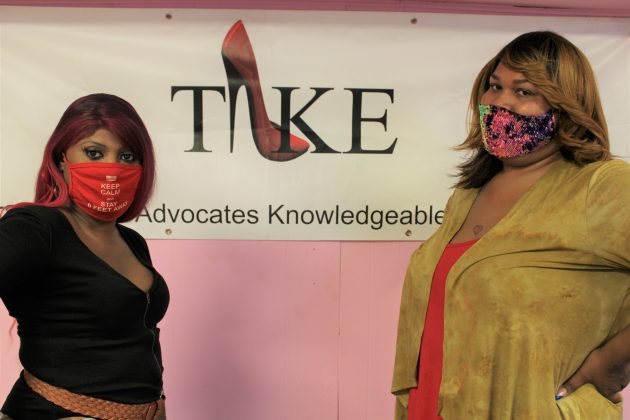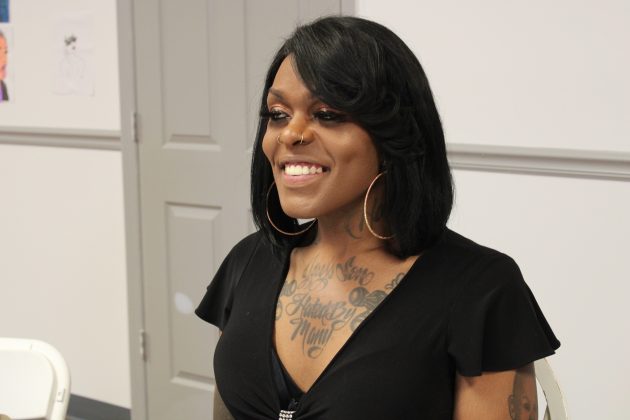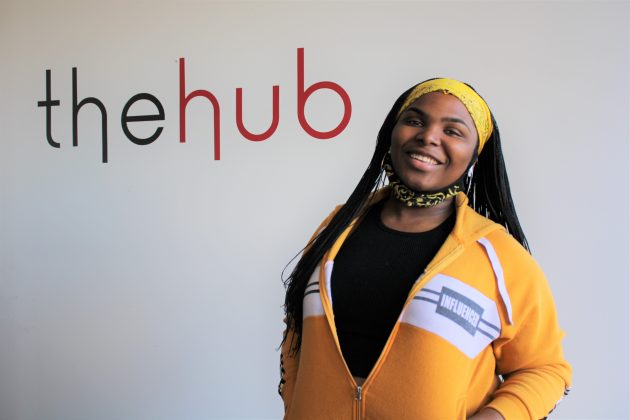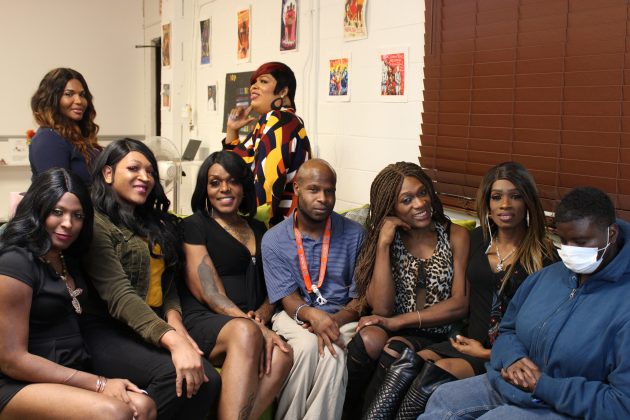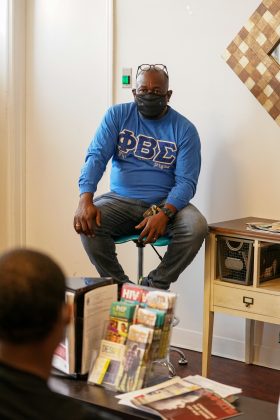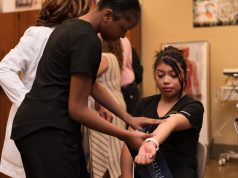
By Sydney Melson
The Birmingham Times
Just as the COVID-19 pandemic upended lives across the U.S. earlier this year, the Magic City Acceptance Center (MCAC) — which conducts monthly support groups for LGBTQ+ adults as well as transgender youths under the age of 14 — moved into a new state of the art building that included visual and hearing stimulation.
A grand opening was held March 7. One week later, the facility closed.
“It feels extra cruel that we just got to this phase of our dreams—[the building] finally has everything we’ve ever wanted to offer people—and now no one can even have access to it,” said Lauren Jacobs, MCAC outreach coordinator.
Since that time, however, MCAC has rebounded and seen benefits it never could have imagined. Though the organization, located at 3130 Third Ave. S., isn’t currently open for drop-in visits, it conducts virtual support groups, including an online chat room where local community members can chat any time.
Other LGBTQ organizations across Birmingham have made adjustments, as well. Despite the pandemic slowing some programs, it didn’t prevent them from providing much-needed services. A few examples:
- The Hub (2217 6th Ave. S.), a resource program for LGBTQ youth of color, recently re-opened its drop-in services that allow individuals to chat and hang out. “We can have up to 10 people in the building,” said Tony Christon-Walker, director of prevention and community partnerships for The Hub.
- Transgender Advocates Knowledgeable and Empowering (TAKE) Resource Center (7746 2nd Ave. S.), which was established as a peer support group for transgender women of color (TWOC), returned to in-person operations in mid-June, while virtual meetings, grocery drop-offs, and a move to a new building continued during the pandemic.
Here’s a closer look at how Birmingham-area LGBTQ groups have adjusted and evolved during the ongoing COVID-19 pandemic.
The Hub
Though The Hub is a resource program for LGBTQ youth of color, its services are open to everyone. Christon-Walker said the organization covers a lot of ground with its community services.
“When [The Hub] was first started in 2011, there were a lot of young gay or queer kids who did not have a place to feel safe,” said Christon-Walker, who became director in 2016. “It was pretty much a drop-in center, but sometimes we help with finding jobs. We also do [sexually transmitted infection (STI)] and [human immunodeficiency virus (HIV) screenings, as well as host parties and events.”
In addition, The Hub has a clothing closet, delivers groceries, and offers residential facilities, he added: “We provide tons of housing to people all across the city for … people who have HIV, [people who] may have severe mental illnesses and cannot live on their own, or people with drug issues.”
In a typical week before the onset of the COVID-19 pandemic, Christon-Walker said he would see 25 to 30 people visit for testing.
“People coming in for other things would put that up to about 100, depending on what was going on [that week],” he said, explaining that events and parties in partnership with other groups, such as Birmingham Black Pride, a week of festivities aimed at celebrating Black LGBTQ culture, could raise those numbers significantly.
“[Sometimes], there could be maybe as many as 300 people in one month,” Christon-Walker said.
The Hub recently acquired a 10,000-square-foot building across from AIDS Alabama on 7th Avenue South. The building will help create a space for low-income people who need a community center, as well as transform the STI and HIV clinic into a wellness clinic, Christon-Walker said.
“It’ll offer general services for people who have low incomes, in addition to a gym, a dance and yoga studio, and a computer lab,” he said, pointing out that the facility will also offer pre-exposure prophylaxis (PrEP) treatment, a daily medication that can stop HIV from taking hold and spreading in people at risk for HIV and other services and treatment.
The Hub’s greatest importance is giving the people of Birmingham the help they need, whether they need a referral or assistance from The Hub itself.
“[This is a space where people can] just be who they are,” Christon-Walker said. “We want you to be your whole self in the building. As Black queer people, we deal with homophobia and structural racism. We always have to code switch, so [The Hub] is where we want you to bring yourself, whoever you are.”
The Hub has been a safe haven for those like Karina Harris, a TWOC who learned about the resources while attending Wenonah High School; at that time, The Hub was known as the Elite Center.
“I met up with a friend of mine, and we were discussing plans. He told me he was going to the Elite Center, which was a drop-in resource center for the LGBTQ community,” she said. “I was like, ‘OK, cool. I’ll go down there to see what’s going on.’”
Harris, who is 25 and grew up in West End, said she loved the laid-back atmosphere at The Hub, where people in the LGBTQ community help each other.
“After that day, there was not a day that went by when I wasn’t down there just to hang out. Eventually, I started volunteering,” she said.
In 2019, Christon-Walker approached Harris with a job offer. In her current role, Harris works to bridge the gap between the LGBTQ community and the transgender community. There’s distance between the two, and she does her best to bring them together by raising awareness and building a sense of love and respect, she said.
TAKE Resource Center
The TAKE Resource Center, in East Birmingham, has continued operations, offering both virtual and in-person services. TAKE was established in 2010 and has stayed busy, said Daroneshia Duncan-Boyd, founder of the group, who stressed the importance of TAKE as a facility founded by a Black trans woman and run by Black trans people.
“That makes it more relatable to our Black and Brown communities. It’s a service that has never been offered here,” she said. “We do legal services with name changes and birth certificate amendments, and we have an assistance fund for people who need help with bills and food.”
TAKE also provides holistic health services, conducts a mentorship program to help create trans leaders in the community, and offers a safe sex and harm reduction program for local sex workers. Over the course of the pandemic, the facility saw an increase in transgender men needing assistance and has adapted its resources to provide additional help.
“We have 135 to 140 cases currently [of people who use repeat services, such as group sessions or are part of training and mentorship programs], and I think we’ve helped around 30 people in emergency situations [since the pandemic began],” she said.
The biggest roadblock during the pandemic involved communication. It was difficult to make sure people had access via phone or tablet because some clients, especially those who were homeless, didn’t have access to those resources, Duncan-Boyd said.
Still, the closure due to COVID-19 wasn’t entirely negative.
“When the pandemic came, we were still working, holding virtual meetings, and dropping off groceries. We also moved to a new building [in May on Second Avenue South],” she said. “It was a win-win situation.”
TAKE resumed in-person operations in mid-June. Since re-opening, the center is cleaned three to four times a day, hand sanitizer and disinfectant wipes are available, and everyone in the building is required to wear a face mask.
Duncan-Boyd, who transitioned more than 20 years ago, understands first-hand the importance of a group like TAKE.
“I struggled with all types of things, and I do this work to … lessen the chance that [others] have to experience the things I had to,” she said.
Kristy “Lovely” Robinson, 37, who currently serves as vice president on the TAKE board of directors, said the group has been indispensable in helping her learn how to survive as a Black woman. Robinson said she feels respected among her peers, and TAKE helped to build that foundation.
“TAKE helped me learn how to speak up for myself and know my rights,” she said.
MCAC
The MCAC’s Lauren Jacobs said the organization’s facility would normally be open two days a week for drop-in hours, offering LGBTQ people a space where they can connect with peers.
“We also have monthly support groups for LGBTQ adults, as well as [support groups] for trans youth under the age of 14,” she said.
While MCAC isn’t currently open for drop-in visits due to the pandemic, needs-based services, such as laundry and shower access, care packages, and food pick-up, are available periodically. In addition, the organization conducts virtual support groups and created Discord, an online chat room where local community members can chat any time.
“We do things like morning check-ins, during which [group members] pop in and say how they’re doing,” Jacobs said. “In the afternoons, we do things like self-care workshops and watch parties.”
Prior to the onset of the pandemic, MCAC moved to a new building on Third Avenue South and held an open house March 7. The new facility contains more resources to help a broader range of people, including a room with a wall of different textures, in addition to visual and hearing stimulation, where people with sensory needs can decompress. One week after opening, the facility closed due to COVID-19.
Even though COVID-19 brought MCAC’s regular operations to a halt, the organization’s online programs have made services available to more people. During in-person visits, MCAC officials would see 20 to 30 people weekly, while online interactions were roughly 40 a week. Since January, 88 new people joined MCAC—63 after the COVID-19 closures in March, some of whom said their parents would never allow them to show up and be present in person.
“There’s a lot of positivity being in a space where other people share identities with you,” Jacobs said, adding that there are some concerns with the distance resulting from the pandemic.
“[There are some] youth we have not seen in some time, and we know that some are in homes that are not safe,” she said. “We also know there has been an uptick in needs for food and housing resources. … Our community is suffering, everyone’s mental health is suffering, and we can’t necessarily be there to provide the comprehensive services we traditionally would.”
MCAC Director Amanda Keller said the resources provided by LGBTQ groups in Birmingham are indispensable.
“There aren’t many spaces like that for our youth across Birmingham,” she said. “A lot of them are meeting their peers for the first time and getting to have conversations they have not had with anyone else.”
Groups like MCAC show the potential for growth and more acceptance in the area: “Even for those young people who aren’t able to make it to our program, just knowing that it exists in Birmingham makes [the city] less scary,” Keller said.
Even though MCAC closed its drop-in hours during the pandemic, the center has since rebounded.
“Even if you can’t be there physically, it’s still a place for community. It’s a place to feel safe,” said Emily McDowell, 14, a student residing in Eastaboga, Alabama.
McDowell, who is nonbinary (someone who does not fit into male or female gender identities) and pansexual (open to dating people regardless of gender), said the biggest impact of MCAC in Birmingham is that feeling of a safe space, especially in the South.
“It’s a place for queer youth in Alabama to know we aren’t alone. It’s hard when you’re not represented in places [like Alabama] that are extremely religious,” McDowell said. “[At MCAC], you can talk to other people and just know it’s OK—that there are other people here, and we are thriving.”
For more information about …
— The Hub, visit bhamhub.com, call 205-703-4199, or email elitehouse77@gmail.com; you can also learn more on Facebook and Instagram at The Hub Birmingham
— TAKE, visit takebhm.org or call 205-848-5849; you can also learn more on Facebook, Instagram, and Twitter at TAKE Resource Center.
— MCAC, visit magiccityacceptancecenter.org or call 205-407-5799; you can also learn more on Facebook at Magic City Acceptance Center, and Twitter and Instagram at MCAC Bham.

